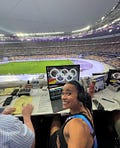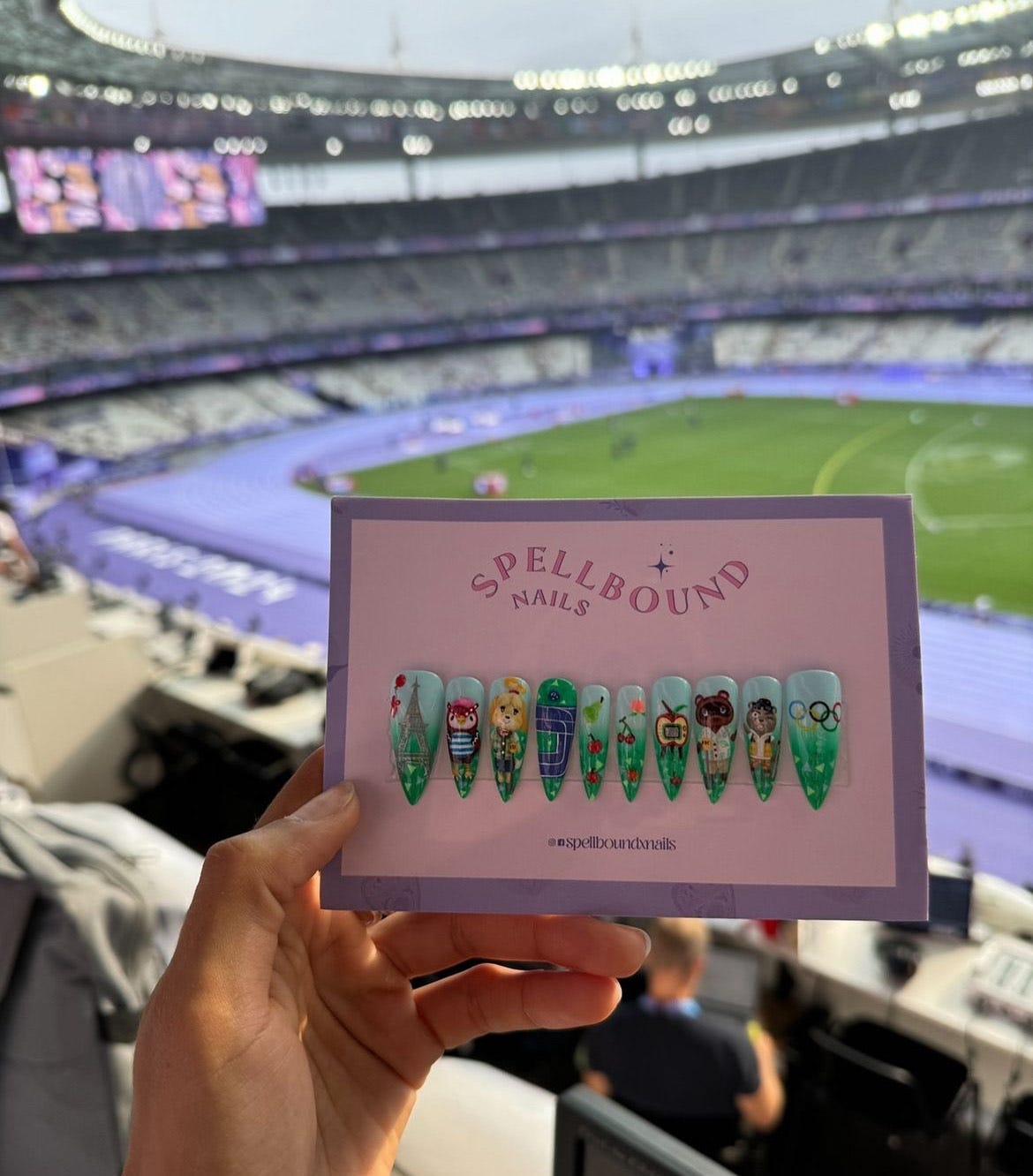What it's like to commentate on an Olympics you should be competing at
An interview with Jazmin Sawyers
Jazmin Sawyers was digging deep into her handbag.
“These are my broadcast nails,” she announced, after pulling out a small plastic package with a beaming smile on her face. “I’ve got to save the Olympic nails and hair plans for four years’ time.”
We were sat in a corner of the busy media room at the Stade de France in Paris, during the gap between the morning and evening sessions at the athletics.
Sawyers, a British long jumper and two-time Olympian, should have been preparing for the final of her Olympic event later that week. Instead, due to a ruptured Achilles tendon suffered in April, she was commentating on the very medals she should have been trying to win.
Sawyers put three years of work and preparation into making the Olympics in Paris - not to mention the years before that. At age 30, no doubt these were the Games she would have been targeting as a peak performance opportunity.
In a cruel irony, her face was plastered across all the Team GB kit launches and sponsorship unveilings too, using images that would have had sign-off before her heartbreaking injury.
When I set up this interview with Sawyers during the Games, I did it to get her unique perspective: an injured athlete in Paris, who was quite literally tasked with offering expert analysis and reaction to her own event as part of the BBC’s coverage.
I wasn’t quite sure what kind of mood she might be in, especially as she had just commentated on the women’s long jump qualifying, watching her peers live out her dream.
No one would blame her for feeling slightly bitter about it all. Instead she was perky as anything, talking me through her adorable nail art: “They’re custom press-ons, and they do them by hand. I got Animal Crossing characters on them and they’re all holding little BBC microphones. A couple of the characters are wearing berets, and the track is purple. One is even holding a javelin, in a nod to my commentary partner Steve Backley’s discipline.”
I know it’s a couple weeks on from the Olympics, but I’m still not over it - so indulge me. I also wanted to share this interview because I think it really gave me new insight into the mindset possessed by elite athletes who spend their careers waiting four long years for their big opportunity.
Spending 30 minutes with Sawyers told me a lot about the patience involved and how reframing experiences beyond being ‘good’ or ‘bad’ was key. Don’t get me wrong, her disappointment was palpable, but so was her positive viewpoint.
“I’ve been really fine, which surprises even me,” she told me. “I have a level of acceptance. But this morning I was getting ready to come to the stadium and all I could think of was everyone else is putting their kit on now. That’s when it becomes real, so I got a bit sad. Sure, it’s hard - it’s an Olympics and I’m watching everyone else do the thing I should be doing. The final qualifying distance was the same distance I jumped in Rio, when I was 22. So that made me feel like, aww. But a lot of them are just my mates, so it’s a cool thing to get to commentate on them.
“I want to be down there so bad, so most of all, it feels motivating. I don’t think I’ve ever been so able to appreciate being able to compete. Failing and losing is sport, but not being able to try is really hard. Today was the first day where I felt okay, this is a bit sad.”
Sawyers had already reset her goals and was rehabbing in Paris to prepare for the next Olympic cycle through to Los Angeles in 2028.
Some athletes only ever get one chance. In the latest episode of my podcast Off The Bench (excuse the plug, but you can listen here or watch here), I chatted with former tennis player, turned pundit, Laura Robson. She won Olympic silver medal in mixed doubles with Andy Murray at London 2012 when she was only 18. In the end, injury blighted the rest of her career and she retired at 28.
She’s been retired for two years, and hasn’t actually played competitively for longer, but she admitted that while working as a Eurosport pundit on the Games in Paris, she had “FOMO” (fear of missing out).
“At the time you just think I’m going to have loads more of these opportunities, or I’m going to play loads more Olympics - that’s genuinely what I thought at the time: I’m going to play five or six Olympics, it’s fine. So I had FOMO for the first time in a long time [watching in Paris], because you just remember how fun it was to be on a team, and to have that experience with a group of people.
“Coming from an individual sport it’s just so special that you can hang out altogether for that period of time. So it was the first time in ages that I’d been, not emotional, but reminiscing about what might have been.”
An event that only rocks around every four years is rare. And knowing how few opportunities some get to do it, athletes often put everything on the line to be there. Sky Brown may be at the beginning of her career, at only 16, but competing at her second Games in Paris, she literally pushed her body to its limit to get to the end of her skateboarding event.
I had a 20-minute interview slot with her the day after she won her bronze medal, and she winced as she sat down. Her agent then knocked on the door midway through our chat with a bubble tea and some painkillers, which Brown gratefully accepted.
During the qualifying event the previous day, she re-dislocated her shoulder - an injury she first picked up on the eve of the Games. With just a few hours to go until the final, Brown simply asked her dad to push her shoulder back into place so she could compete. This teenager is tougher than most.
“At least that one was quick,” she told me of the injury, as compared to the previous time she dislocated the joint. “It was a shock, and definitely scary. But it was part of the story. I was always going to push somehow [to compete in the final]. With my knee [injury] and my shoulder, I think it made getting the medal all the more special.”
She then went on to tell me about all her new goals for Los Angeles in 2028 - including competing in both skateboarding and surfing.
Listening to elite athletes speak with such certainty and drive, immediately after a competition, it is not always easy to relate (I struggle to plan my week, let alone the next four years). But that’s what makes them so impressive, and separates them from the rest of us.
My overriding takeaway from speaking with Sawyers was similar — she remained unflinching in her self-belief, even when things had gone as wrong as they did. From the outside it might be hard to understand, but that is what’s needed to get to an Olympics (or three, as is Sawyers’ aim).
“The way I’m viewing it, every time you hear of a champion’s story, something has happened and they’ve been through something,” Sawyers said. “This is just my thing. I’m at the bottom point but that will set me up to be a champion. Nobody gets that without going through something. It’s just my turn.”
Recommendations
Next week the Paralympics begin, where more dreams that have been three years in the making begin. I’d recommend Channel 4’s documentary ‘Amputating Alice’ on Paralympics GB swimmer Alice Tai, which is brilliant. Channel 4 will have full coverage of the Paralympics in the UK.
The US Open also begins on Monday, and I’ll be having FOMO watching from home this time, after begin there for the past two years.
You can watch the action on Sky Sports via NOW. The Tennis Podcast is your best bet for comprehensive coverage of every storyline with their daily episodes.





